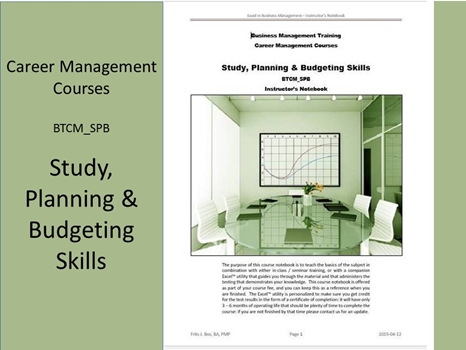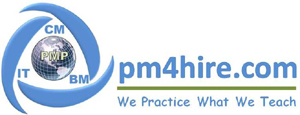
Study, Planning, & Budgeting Skills BTCM_SPB
Our intent is to help you to make a transition into what structured learning is about. We explore focus and commitment to help you achieve your goals, both in education and in preparation for a career path that will continue to serve you long after you have graduated regardless of career choice preferences. If it has been a few years since you were in school you may need this course to get started on the right track. This starts with self-discovery, and creating a focus on the successful completion of your studies. Self-discovery is an important aspect of planning what to do with your future: selecting a program of study simply because it sounds impressive will not be the most effective outcome for many people, as we can see individuals with university degrees that have no interest in pursuing a career based on that academic foundation.
This learning program is based on 5 stages, outlined in the tabs below, that explore the nature of studying and the habits that will help or hinder progress. This may be unexpected, but where in the past you studied in an imposed, controlled setting, for adult education you are the only driver in this process – that means you need to understand how to become motivated to be driven to success. One of the positive aspects of our brand of adult education is that we offer choices with respect to the courses you may be interested in, rather than to impose a bundle of courses within a set program of study. What courses you select, and in what order, depend entirely on where you see yourself today relative to where you would like to be. Our courses can be paced so that you can manage the cost of your education without taking on a huge debt from government loan programs or other sources. We do not impose restrictions or qualifications: while it is preferable to have a high-school diploma as a foundation for studies, with adult learners we find that there is not always a direct correlation between preparation and final outcome. Adult learners have the life experience to deal with things that happen, and in many cases they seem to cope better and succeed in studies where a younger student with a high-school diploma might drop out.
Introduction to Studying & Budgeting basics = understand the major objectives for pursuing education and what role the formal education plays in a long-term learning culture. Establish an understanding of what motivates each student to succeed in the learning program, and how to go back to basics as required, to re-energize the study efforts at times when things get tough. This is a self-discovery opportunity where each student can formulate how they prepare for an education that does not necessarily have to focus on a college diploma but on current needs. You will find that success in business is less dependent on what you know than on what you do with it, and that you can attain success without accumulating a mountain of debt that haunts you.
Learning strategies and career compatibility = explored using the MBTI to help determine what the best options are for each individual based on their natural tendencies and interests. Most importantly, understanding how we are unique and different helps student to understand what steps may be required to accommodate others in order to communicate more effectively: that is often a critical success factor in a future career opportunities, and should be kept in mind for further career planning efforts (see Career and Employment Strategies). This discovery will help you to understand past mistakes and to seek out career options that you are compatible with, and best of all you will discover that there is no judgment involved in any of this.
Career focus = personality and focus must be compatible with the career field selection, so it is important to explore the options available in your chosen field. In order to do this we need to become familiar with resources available on the internet: at this point less to find employment, and more to determine if that kind of employment is something we’d like to strive for based on the career field we are aiming for. Understanding what employers look for in candidates gives us relevant and current information about what to emphasize while we study. It is important to understand how change affects everyone, and that the velocity of change makes it unlikely that you will remain at the company where you were first employed. How you prepare yourself is what makes the difference in succeeding in your career. Analyzing jobs that represent your desired career will help you to identify what kinds of skills you need to develop in order to get a foothold on that career path.
Objectives setting = studies are a means to an end – you need to develop clear goals that help you to put progress into perspective. This is what makes a career college different from college or university focused on learning as an objective. What will it take to combine theory with real practical experience that prepares you for the workplace? Based on what we learned about a career field we can create a longer-term plan of education, starting with the current program of studies, and then identifying what future opportunities open up with additional training. Note that all our courses are available for a flexible selection so you can mix and match from different programs in order to get the results you want. If you are already employed, for example, you might want to select courses that can provide an immediate payback.
Study habits, Part-time jobs, and Staying Motivated = you will learn strategies to cope with life as a student and full- or part-time employee, and in some cases as a spouse and/or parent, all at once. Depending on how well you grasp the subject material in class you may need extra study hours: your employer might selfishly focus on your availability, kids are selfish by nature, and nobody has found a way to extend the day beyond 24 hours. There will be days when it does not seem worth the headaches – prepare for what you can do to stay on track. You may want to consider coping strategies, such as working with a coach who will help you to achieve your career objectives through learning. Your level of motivation is directly affected by the level of positive feedback you experience – sometimes it works to work in groups and use peers to help you through the anticipated down-periods until you reach your goal and feel prepared to take that next step on the career ladder.
Learning Formats BTCM_SPB
This course is currently available in a classroom setting (public or company private) with approximately 15 contact hours.
PDF – Certificate Of Completion
This course offers a certificate of completion that identifies the course, the student, and a brief description of the course. To receive a certificate the student must have attended at least 80% of the course sessions. This personalized certificate is forwarded to the student by Email.
PDF – Course Notebook
This course includes a notebook in PDF format that provides the minimum knowledge the student must master in order to obtain the certificate. In the notebook you will find references to other study materials. Students receive the notebook by Email when their registration is confirmed.
PDF – Program Overview
An overview of this study program can be downloaded from the website by right-clicking on the program link on the enquiry page.
PDF – Current Training Schedule
A list of upcoming training sessions can be downloaded from the website by right-clicking on the schedule link on the enquiry page.
Registration – Service Providers
To register for any training course please look on the enquiry link page of your service provider (from where you accessed this website). On the page you will find a registration request form where you can order the course that you are interested in. The availability dates will be provided to you, along with payment instructions if you decide to go ahead.

 |
|